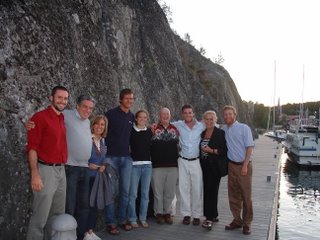June 26, 2006
Ship s Log
June 26th 2006
Departure Location: Mattskar, Aland Islands
Departure Time: 10:00 hours
Distance Traveled: unknown
Arrival Location: Eckero, Aland Islands
Arrival Time: 17:00 hours
Weather: Started sunny with accumulating fog throughout the day. Light rain overnight.
Personal Comments:
Last night was one of the most interesting so far. We stayed in a protected cove overnight but could find no place to tie up on shore and were forced to rely on our anchor. To make sure that we wouldn’t find ourselves drifting out to sea in the middle of the night we set a depth alarm on the boat and put ourselves to bed. It will probably not come as a surprise to know that we were roused several times in the middle of the night by the alarm and rushed to check things out. Having an alarm going off every few hours doesn’t make for restful sleeping conditions.
Despite our lack of sleep we managed to keep our spirits up during the day. The sailing was calm and we ended our day at Eckero, the second largest city in the Äländ Islands. There, we found showers, internet, and most importantly laundry. After trying to wash our clothes by hand we have all agreed that it is generally just better to wait until finding a laundromat whenever possible.
What is most amusing about this port is that given its description as the second largest city in the Äländ islands we were looking forward to having a fair amount of places to blow off steam and go shopping. Much to our surprise however what we found was not a small city, or even a large town, but rather a gas station/supermarket, a few coffee shops, and a ferry terminal.
Mostly I mention it just to give some perspective on what it must be like to live in this part of the world. We, being mostly a young crew to begin with, were feeling especially sympathetic toward the teenagers in these tiny villages. What would it be like to be rebellious in places such as these? It boggles the mind.
Research Comments:
Some readers have argued that Vinci’s massive accumulation of homotopes are not credible because he remaps them as a set from the Baltic to the eastern Mediterranean. Our usual experience of homotopes, such as those found in New York state, where we can find a Troy, an Ithaka, a Rome, an Utica, a Carthage etc.—does not include the remapping of them as a set, but only as a random use of individual names here and there.
The experience of navigating tens of thousand of islands and skerries in the Baltic, between Stockholm and Helsinki, has given us a greater appreciation for what might have led the ancient Greek sailors to remap homotopes as a coherent set rather than randomly.
Consider the challenge to these sailors in their earliest centuries of Baltic sailing. Individual sailors likely exchanged information with each other and agreed on names, and sailors within a culture or a language group would continue this process of regularization and consolidation among themselves. This set as a whole would be passed on by various mnemonic devices, including metrical lists and catalogues such as the Catalogue of Ships in Book Two of the Iliad, or the many catalogues whose fragments we see in Hesiod’s works. The place names as a set would in effect constitute one of the most vital treasures of the culture.
When forced by environmental stress and climatic downturn to migrate south, what would be the attitude of the migrants towards these long standing cultural tools of naming islands and sights useful for navigation? It seems unlikely that the subset of travelers who reached the Eastern Mediterranean, to a landscape and seascape far more strikingly similar to their abandoned Baltic homeland than any they had seen previously, would abandon their system of naming. They would have been presented with an interesting set of options. They could adopt the “natives” place names; they could slowly and laboriously generate and consolidate a set of new ones; or they could see how far they could get by remapping their old Baltic names onto their new homeland as an anlogical set.
This last alternative, on consideration, has considerable merits as compared to the first two. The set of names is already deeply engrained in collective cultural memory, and in addition to sentimental value (which is all one imagines the classical and British placenames in New York State provided for their first employers) they would be far easier for all within the culture to agree. Indeed, they would reaffirm the pride this sailing culture must have in this collective creation, which was useful for navigation and celebrated in epic song by generations of bards. It is also true that these names would be mnemonically useful. The more one thinks about this option of remapping as a set, the more attractive it becomes.
The process of transferring old cultural standards and place names is well established in other cultures. One of the well known problems encountered by Indologists is the fact that the RigVeda, a body of oral transmitted texts considerably larger than Homer, have virtually no place names, flora, or fauna to attach them to their current setting in India.


0 Comments:
Post a Comment
<< Home